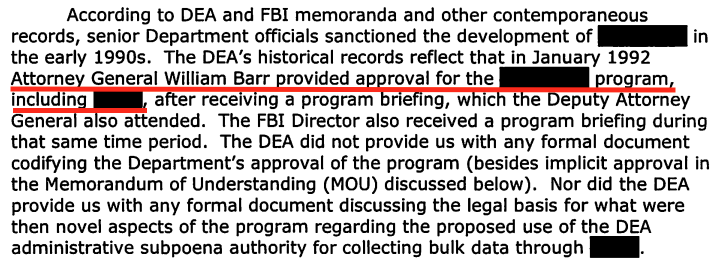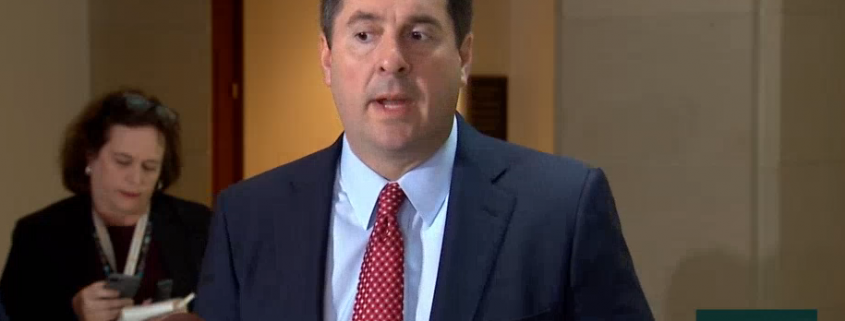As part of the draft Section 702 Reauthorization released this week, the House Judiciary Committee included what I’ll call the anti-leak package. They’re not actually presented in the same Title, but I want to consider them as a group as a way to consider whether they’ll do anything to make leaking less useful than internal whistleblowing.
The package consists of three things:
- Increased penalties for improperly handling classified information
- New protections for FBI whistleblowers and contractor whistleblowers
- A GAO report on whether classification works
Increased penalties for improperly handling classified information
The first part of the package changes 18 USC 1924, which criminalizes unauthorized retention of classified documents, to make knowingly retaining classified information a felony, while creating a new misdemeanor for negligently retaining classified information.
SEC. 302. PENALTIES FOR UNAUTHORIZED REMOVAL AND RETENTION OF CLASSIFIED DOCUMENTS OR MATERIAL.
Section 1924 of title 18, United States Code, is amended—
(1) in subsection (a), by striking ‘‘one year’’ and inserting ‘‘five years’’;
(2) by redesignating subsections (b) and (c) as subsections (c) and (d), respectively; and 13 (3) by inserting after subsection (a) the following new subsection (b):
(b) Whoever, being an officer, employee, contractor, or consultant of the United States, and, by virtue of his office, employment, position, or contract, becomes possessed of documents or materials containing classified information of the United States, negligently removes such documents or materials without authority and knowingly retains such documents or materials at an unauthorized location shall be fined under this title or imprisoned for not more than one year, or both.
I think this was done to make what Hillary Clinton did a clear felony, so Republicans can squawk about it, rather than solving any real problem.
Which is a pity. Because those who want to write new laws criminalizing the retention and leaking of classified information (something I’m not advocating, but I understand the sentiment), it might be useful to write laws that address the problems we’re actually seeing.
For example, the Espionage Act should be rewritten to make it clear it only applies to real Espionage — the secret sharing of “national defense information” (which should be better defined) with an adversary for some kind of personal benefit. By all means, create something else that applies to the Edward Snowdens and Chelsea Mannings of the world, if you feel the need to. But in that law, do something to ensure that the David Petraeuses of the world — who leaked information to get laid and tell nice stories about himself — don’t get a wrist slap, while people who at least believe their acts to be benefitting the country face life imprisonment.
The degree to which the Espionage statute specifically, and leak prosecutions generally, have become the means to pursue arbitrary retaliation against people who don’t hew a party line undermines the legitimacy of the classification system, which (in my opinion, as someone who has covered most recent leak prosecutions) just leads to more leaking.
In related news, one of the reasons why magistrate Brian Epps Cobb denied Reality Winner bail yesterday is because she admires Snowden and Assange.
In addition, this week’s news that an NSA TAO hacker brought files home and used them on his machine running Kaspersky, thereby alerting Russia to them, suggests the need to consider the impact of even negligent improper handling, because it can have an impact akin to that of Snowden if it is compromised.
Finally, there should be some controls over abuse of Original Classification Authority, both in Prepublication Reviews, to prevent the selective censorship of important stories. And there should be some recognition that OCAs are often not the only source of information (which is one of the problems with the Hillary emails — her staffers were reporting widely known facts that the CIA later claimed a monopoly on, thereby making the information “classified”).
Perhaps the GAO review, below, can go some distance to making this happen.
New protections for contractor whistleblowers
There’s a section that extends the (still inadequate) whistleblower protections of the National Security Act to contractors, while adding protection (just for contractors!) for the reporting of “evidence of another employee or contractor employee accessing or sharing classified information without authorization.” It also adds additional reporting vehicles for FBI contractors (to DOJ or FBI’s Office of Professional Responsibility, to FBI’s Inspection Division, or to the Office of Special Counsel).
The bill also adds contractors to those you can’t retaliate against by stripping of security clearance if they’ve made a protected disclosure.
Contractor is defined as “an employee of a contractor, subcontractor, grantee, subgrantee, or personal services contractor, of a covered intelligence community element.”
As I said, this is just the protection extended to intelligence community employees, with enforcement by the President, the same guy who orders up the illegal activities (such as torture or domestic spying) of the IC.
Plus, I’m not sure the language protects against two other problems that have happened with contractors. First, the loss of a contract, which doesn’t seem to be included in the definition of personnel decisions. So an agency could retaliate not by denying a promotion, but simply denying a contract. And, for similar reasons, I’m not sure the language prevents a contractor from retaliating against one of their employees directly, particularly if they’re threatened with losing work.
As I said, I’m not sure on this. I await analysis from the people who work whistleblower issues all the time.
That said, while this is an important improvement that will extend the same inadequate protection that IC employees get to IC contractors, I think it doesn’t necessarily protect against some known kinds of retaliation.
A GAO report on whether classification works
Perhaps most interestingly, the bill asks GAO to conduct on a story on why we’re having so much leakage.
SEC. 303. COMPTROLLER GENERAL STUDY ON UNAUTHORIZED DISCLOSURES AND THE CLASSIFICATION SYSTEM.
(a) STUDY.—The Comptroller General of the United States shall conduct a study of the unauthorized disclosure of classified information and the classification system of the United States.
(b) MATTERS INCLUDED.—The study under subsection (a) shall address the following:
(1) Insider threat risks to the unauthorized disclosure of classified information.
(2) The effect of modern technology on the unauthorized disclosure of classified information, including with respect to—
(A) using cloud storage for classified information; and
(B) any technological means to prevent or detect such unauthorized disclosure.
(3) The effect of overclassification on the unauthorized disclosure of classified information.
(4) Any ways to improve the classification system of the United States, including with respect to changing the levels of classification used in such system.
(5) How to improve the authorized sharing of classified information, including with respect to sensitive compartmented information.
(6) The value of polygraph tests in determining who is authorized to access classified information.
(7) Whether each element of the intelligence community (as defined in section (4) of the National Security Act of 1947 (50 U.S.C. 3003(4))—
(A) applies uniform standards in determining who is authorized to access classified information; and
(B) provides proper training with respect to the handling of classified information.
(c) COOPERATION.—The heads of the intelligence community shall provide to the Comptroller General information the Comptroller General determines necessary to carry out the study under subsection (a).
(d) REPORT.—Not later than 180 days after the date of the enactment of this Act, the Comptroller General shall submit to the Committee on the Judiciary and the Permanent Select Committee on Intelligence of the House of Representatives and the Committee on the Judiciary and the Select Committee on Intelligence of the Senate a report containing the study under subsection (a). (e) FORM.—The report under subsection (d) shall be submitted in unclassified form, but may include a classified annex.
I really like the idea of doing such a report (though am not sure GAO can get it done in just 6 months, especially since I’m sure some agencies will filibuster any cooperation). And what a novelty, to finally consider whether polygraphs actually do what they’re claimed to do (rather than get people to confess to dirt that can later be used against them or leaked to China in an OPM hack).
As mentioned above, a really thorough such study should also look specifically at the Prepublication Review process, which is one of the most notorious forms of arbitrary use of classification.
It should also try to quantify how much classification does (abusively) hide mismanagement or law-breaking, especially in the FOIA process.
A truly thorough study would have to include leaks by members of Congress, up to and including the Gang of Four — but that’s never going to happen and so that means of leakage will remain untouched.
A study should also not only review recent leak prosecutions, with a particularly focus on the selectivity with which they’ve been taken, but compare leak prosecutions with the efficacy of internal measures (like stripping someone of clearance), which ODNI has been using more in recent years, at least before Reality Winner.
And a study should do a macro review of the initiatives put in place since Chelsea Manning’s leaks, to review overall compliance (we know NSA and CIA had not fully complied as of last year), and to measure whether those initiatives have done any good.
Finally, for the classified version, the report should include a full measure of how much internal spying is being targeted at government employees and contractors in various CI programs, and whether those are overseen adequately (they’re absolutely not).
Will this all do any good?
As I said, I’m the one lumping these together into a package, not the bill’s authors. I did so, though, to better weigh whether this will do any good — whether we’ll move the balance on necessary discussions for democracy being weighed against genuine need to protect secrets. I think an actual assessment is worthwhile.
But ultimately, I suspect our leak problem stems, in large part, from the degree to which classification (and clearances and leak prosecutions) have all been designed to give the Executive Branch unfettered ability to run an arbitrary system of secrets that does as much to serve nexuses of power as it does to keep the country safe. Secrets, in DC, have become the coin of power, not the necessary tool to ensure a vibrant and secure democracy.
And I’m not sure this effort will do much to change that.





![[Photo: National Security Agency, Ft. Meade, MD via Wikimedia]](https://www.emptywheel.net/wp-content/uploads/2017/08/NationalSecurityAgency_HQ-FortMeadeMD_Wikimedia.jpg)




